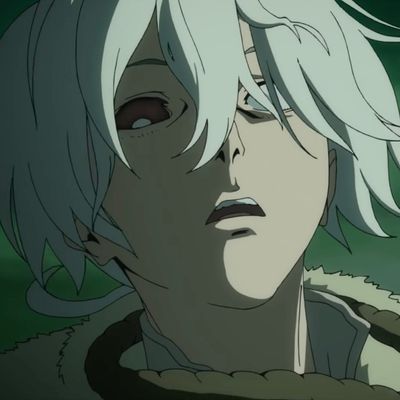
Studio Ghibli is internationally beloved for its immersive, fantastical films, such as Spirited Away and Princess Mononoke. But the perfectionism of its founders, including Hayao Miyazaki and the late Isao Takahata, means that fans of the trailblazing Japanese animation studio have often waited years between new releases. While viewers trust that Ghibli films will be more than worth the wait, that doesn’t make it any easier during these hiatuses to find something to watch that matches the studio’s stunning animation, complex themes, and ability to weave between the whimsical innocence of childhood and the grueling realities of existence. The new anime series To Your Eternity comes darn close.
Debuting in April, with subtitled episodes hitting Crunchyroll weekly following their Japan broadcasts, and dubbed ones releasing seven weeks behind on Crunchyroll and HBO Max, To Your Eternity follows an uncommon premise: A mysterious creator sends an immortal, sentient orb to Earth where it begins mimicking what stimulates it. First taking on the form of a rock, then a wolf, and eventually a boy, the orb — who later is given the name Fushi — slowly develops a sense of identity and begins to discover what it means to live.
As Fushi wanders the world in search of stimulation in order to grow, there is a sense of preciousness about the simple interactions that give shape to a person’s life. Moments of quiet reverence for everyday experiences — such as the ecstasy of eating fresh-picked fruit, the pride in providing for others, and the comfort of enduring companionship — lend the series a similar rhythm and sense of wonderment that have come to define Studio Ghibli’s oeuvre. (The show’s rich scenic design, imaginative animation, and sweeping soundtrack also add to the lived-in beauty of this world). But as much as To Your Eternity celebrates the charming joy of the mundane, so does it recognize the ways that loss and loneliness are inextricably knitted into the human experience.
Throughout the currently airing 20-episode series, we see Fushi befriend several young characters who attempt to maintain their virtuous optimism in the face of increasingly brutal realities. These include an unnamed boy who decides to leave his abandoned tundra village in hopes of reuniting with his family in paradise; the rambunctious girl March, whose dreams of becoming a mother one day are threatened when she’s selected to be sacrificed to a god; and the wishful boy Gugu, whose dedicated efforts to change his fate are derailed by a horrific accident.
As Fushi becomes enmeshed in the lives of those he encounters, he sees how some are able to successfully change their once-dire circumstances for the better, while others merely have to change their perspective to focus on what they have rather than what they lack. But then, there are the times when they’re unable to change their circumstances, ultimately succumbing to tragic fates despite Fushi’s best efforts to protect them. With each of these experiences, Fushi understands a little more about the rich, and often painful, complexity of what it means to be human, and his powers grow in tandem with the depth of his emotional responses to these events.
Much like Studio Ghibli, To Your Eternity feels heavily influenced by the Japanese concept of mono no aware, an understanding of the melancholic beauty of life’s impermanence. With Fushi beginning as a blank slate, he must painstakingly learn everything from developing consciousness, to how to eat, to how to laugh, to how to grieve, all while his magical abilities separate him from the world he was designed to imitate. Fushi’s unusual path toward maturity, as well as his immortality, mean the series is able to tell a unique, emotionally resonant tale about the transience of existence for those coming of age — a theme that also provides much of the pathos in Studio Ghibli films.
But what truly connects Ghibli’s and To Your Eternity’s explorations of the bittersweet transitions between childhood, adolescence, and adulthood is the shared acknowledgment of what these experiences cost. In Kiki’s Delivery Service, this transition comes with the loss of Kiki’s ability to communicate with her familiar Jiji. In The Tale of the Princess Kaguya, the princess loses the freedom to choose her destiny and all memories of Earth. In Spirited Away, Chihiro has to leave her beloved Haku behind. And in To Your Eternity, this process comes with its own set of painful costs, from his loss of innocence to the loss of loved ones.
In Spirited Away, the witch Zeniba tells Chihiro, “Once you’ve met someone, you never really forget them.” At its heart, this is what To Your Eternity is about. As an immortal, Fushi is doomed to eventually see all those he loves die, whether at the hands of their enemies or from natural causes. While some of these relationships are short-lived, each of them leaves a distinguishable impact on Fushi. With each new connection Fushi develops, the intense feelings he experiences become embedded inside him, allowing him to take on the forms of those he loved once they’re gone. But it quickly becomes clear that these people aren’t really gone at all. They all live on in Fushi through the forms he takes and through his ongoing pursuit of their dreams — whether that be to see the world, to grow up, or to have a family.
To Your Eternity is a wholly empathetic story that balances the thrills of a magical adventure with a transcendent coming-of-age story about what it means to live in a world defined equally by tender dreams and callous realities. With its poetic storytelling, humanist themes, and mesmerizing animation, To Your Eternity touches upon all the elements that make the Studio Ghibli films so compelling while delivering an inventive, original narrative that will utterly sweep you away. So take Fushi’s lead and give yourself over to all the emotional highs and lows of this enchanting new world.




